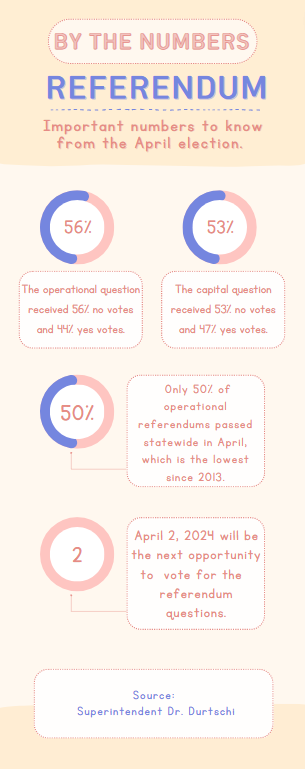District looks to move forward after referendum voted down
May 5, 2023
The referendum results of the April 4 election have been posted and neither the operational nor capital questions passed. The results were very close with the operational question receiving 1349 (44%) yes votes and 1730 (56%) no votes and the capital question receiving 1436 (47%) yes votes and 1636 (53%) no votes. These questions were asking taxpayers for funds to keep the district running smoothly with no changes in budget. Because both referendum questions failed, the district is making a plan to offset a future budget shortfall.
“We will need to make some challenging decisions regarding where we are able to reduce costs so we are able to balance our budget for next school year. Some of those cuts may affect services, programs, transportation and other aspects of our district. It will be our job to try to keep the impact of those cuts as far away from negatively impacting our students’ educational experience,” Superintendent Dr. Emmett Durtschi said.
Though the results are disappointing to the district and the future maintenance of the school, School Board Member Nick Bartol is understanding of these votes but knows that a change must occur.
“Since Berlin has not had an operating referendum in the past, I can understand the hesitancy, even more so when coupled with uneasy economic times. But, state support is not keeping up with the realities of what schools are required to provide to today’s students. This is causing more and more districts to go to referendum to approve more operating funds,” Bartol said.
For high school teacher Ryan Scanlan his worries lay in the future of his children and the teachers in the district.
“As a parent I am concerned that programs or opportunities for enrichment could be cut or reduced. But my primary worry is the likelihood that the district will be able to convince the community with the current economic situation and how that could affect the school’s ability to keep all staff and pay at the same level,” Scanlan said.
The current economic times have caused worry amongst many districts in the state. This year’s state-wide referendum voting has reflected that.
“Across the state of Wisconsin, a larger percentage of school referendums failed to pass this spring, bucking the upward trend seen in recent years. Only 50% of operational referendums passed in April, which is the lowest since 2013,” Durtschi said.
The district has managed the funds as diligently as possible, but the funds have begun to run out. That is the reason that the district turned to the referendum in the first place and will continue to advocate for it.
“Berlin has and will continue to spend less per student than the state average. Funding from the state has also not kept up with inflation for more than a decade. Current funding formulas are structured in a way to push districts to go to referendum to keep up with expenses,” Bartol said.
Despite the disappointment in the end result, the dedication of the community to the district has not been questioned.
“I appreciate all those who read about the referendum, informed themselves about our schools and turned out to vote. I encourage everyone, including our students, to remain civically aware and engaged. We have a lot to be proud of in our schools and community. I look forward to continuing to work together to bring about a future where all of our students reach their goals, hopes and dreams,” Durtschi said.











